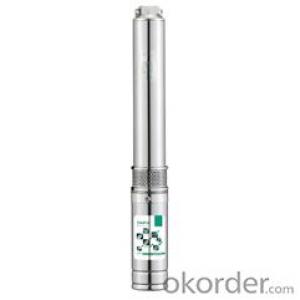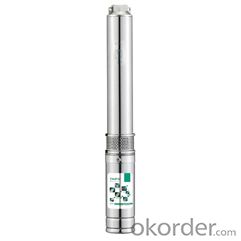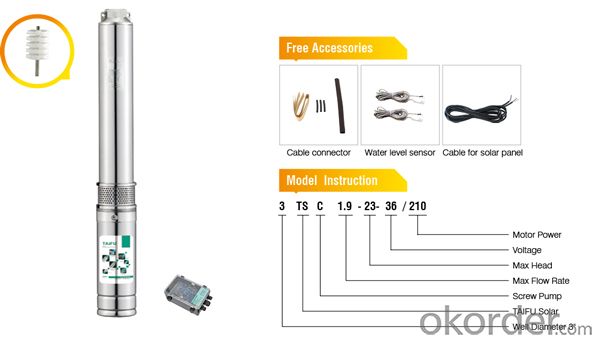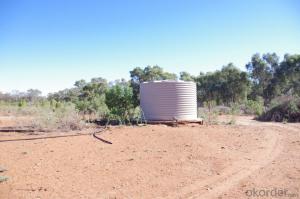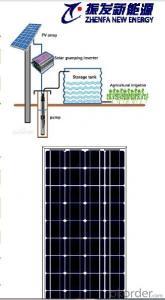Handuro Solar Pump 3tsc/4tsc Stainless Steel CE Solar Panel
- Loading Port:
- Shanghai
- Payment Terms:
- TT OR LC
- Min Order Qty:
- 50 pc
- Supply Capability:
- 100000 pc/month
OKorder Service Pledge
OKorder Financial Service
You Might Also Like
1.APPLICATION AREA:This project products are mainly used in dry region for irrigation of agriculture, It can be used for drinking water and
living water. The living condition could be much improved. It also can be used for fountains.2.MATERIAL OF PARTS:Outlet: stainless steel
Pump body: stainless steel
Motor body: stainless steel
Bearing: C&U
3.ADVANCED TECHNOLOGY:1.Application innovation
Compared with the traditional alternating current machine, the efficiency is improved 25% by the permanent magnetism, direct current, brushless, non-sensor motor.
2.Technics innovation
Adopt double plastic package for rotor and stator, motor insulation≥300MΩ, the motor security was much improved.
3.Structure innovation
Oil filling, convenient installation and environmental protection4.HIGHLIGHTSa.Energy-saving and environment-protected green products
b.High technique products adopting MPPT and DSP chip technique.
c.100% copper wire, cold-rolled silicon steel sheet
d.CE certificate
e.Advanced three phase brushless DC motor
f.Stainless steel 316 screws
g.3 years warranty5.PRINCIPLE OF OPERATION:Solar panel collects sunlight→DC electricity energy → solar controller(rectification,stabilization,amplification,filtering)→available DC electricity→(charge the batteries)→pumping water6.ADVANTAGES OF SOLAR PUMP SYSTEM:A.It is easier and more widely used than any other dynamoelectric driven pumps.
B.It is more economical and more environmentally friendly.7.MODEL SELECTION:a.The power of solar panel = power of pump ×1.3
The voltage of solar panel = the voltage of pump
The controller should be matched
b.Select the batteries according to the following formulas:
The use hour of battery =
The battery capacity ÷(the machine power÷the battery voltage)×0.6 For example,the machine power is 200W, the battery
capacity is 100AH,the voltage is 12V,and the battery is fully charged,then the use hour is:100÷(200÷12)×0.6=3.6hours
c.The battery capacity=
the use hour ÷0.6×(the machine power÷the battery voltage) For example,the machine power is 200W,the battery voltage
is 12V,and the battery need to be used for 3.6hours,then the battery capacity is:3.6÷0.6×(200÷12)=100AH

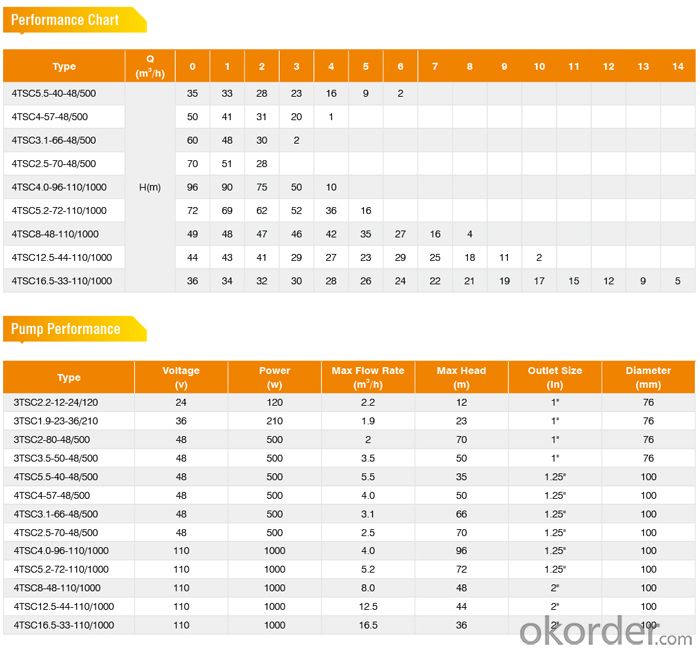
- Q: How do I monitor the performance of a solar pump system?
- To monitor the performance of a solar pump system, there are several key steps you can take: 1. Install monitoring equipment: Start by installing a monitoring system that can track and record various parameters of the solar pump system. This may include sensors to measure solar radiation, pump output, battery voltage, water flow rate, and other relevant variables. The monitoring equipment can be connected to a central control unit or a data logger for data collection. 2. Set performance benchmarks: Determine the performance benchmarks or targets for your solar pump system. These benchmarks may include desired water flow rate, battery charge level, or pump efficiency. Having clear benchmarks will help you evaluate whether the system is performing optimally or if there are any issues that need attention. 3. Regularly review data: Check the monitoring data regularly to assess the system's performance. This can be done by analyzing the collected data manually or by using software that can present the data in a more organized and comprehensive manner. Look for any deviations from the benchmarks and identify any patterns or trends in the system's performance. 4. Conduct performance audits: Periodically conduct performance audits to evaluate the overall efficiency and effectiveness of the solar pump system. This can involve observing the system's operation, measuring parameters on-site, and comparing the results with the benchmarks. Performance audits can help identify any inefficiencies, malfunctions, or maintenance needs. 5. Utilize remote monitoring: Consider using remote monitoring capabilities if available. Remote monitoring allows you to access real-time data and receive alerts or notifications if any critical parameters deviate from the desired range. This offers the advantage of proactive monitoring and early detection of potential issues, enabling timely corrective actions. 6. Regular maintenance and servicing: Ensure regular maintenance and servicing of the solar pump system. This includes cleaning of solar panels, checking and tightening connections, inspecting pipes and valves, and testing the overall system functionality. Proper maintenance ensures optimal performance and helps prevent any potential breakdowns or inefficiencies. 7. Seek professional assistance: If you are unsure about monitoring the system yourself, consider consulting with a professional solar installer or a technician specialized in solar pump systems. They can provide guidance on the specific monitoring equipment and procedures needed for your system, as well as offer expert advice on troubleshooting and optimizing its performance. By implementing these steps, you can effectively monitor the performance of your solar pump system, identify any issues or inefficiencies, and take appropriate actions to ensure its optimal operation.
- Q: How does a solar pump handle water source pollution from agricultural activities?
- A solar pump does not directly handle water source pollution from agricultural activities. However, it can contribute indirectly to mitigating pollution by promoting sustainable and efficient water management practices in agriculture. By providing a clean and renewable source of energy to power irrigation systems, solar pumps reduce the reliance on fossil fuels and minimize greenhouse gas emissions. This can encourage farmers to adopt eco-friendly irrigation techniques such as drip irrigation or precision farming, which can help reduce the use of chemical fertilizers and pesticides that contribute to water pollution. Therefore, while a solar pump may not directly handle pollution, its implementation can encourage sustainable agricultural practices, leading to a healthier water source.
- Q: Can a solar pump be used in areas with limited sunlight?
- A solar pump can still be used in areas with limited sunlight, but its efficiency and performance may be significantly affected. The amount of water flow and power generation may be reduced, resulting in less efficient pumping. It is recommended to assess the available sunlight and consult with professionals to determine if a solar pump is a suitable option for such areas.
- Q: What is the maximum pumping depth of a solar pump?
- The maximum pumping depth of a solar pump can vary depending on factors such as the power of the solar panels, the efficiency of the pump, and the type of well or water source. However, on average, solar pumps are capable of pumping water from depths ranging between 100 and 600 feet.
- Q: What is the expected maintenance schedule for a solar pump?
- The expected maintenance schedule for a solar pump can vary depending on several factors such as the type and model of the pump, the quality of components used, the environmental conditions it operates in, and the level of usage. However, in general, a solar pump requires minimal maintenance compared to traditional pumps due to its simple design and reliance on renewable energy. Routine maintenance for a solar pump typically involves the following tasks: 1. Regular cleaning: The solar panels should be kept clean and free from dust, dirt, and debris to ensure optimal sunlight absorption and maximum efficiency. Cleaning can be done with a soft cloth or sponge and mild detergent, avoiding abrasive materials that may scratch the surface. 2. Inspection of wiring and connections: It is important to periodically inspect the electrical wiring and connections to ensure they are secure and free from any signs of wear or damage. Loose or faulty connections can lead to reduced performance or system failure. 3. Checking water levels: Depending on the type of solar pump and its application, regular monitoring of water levels may be necessary. This is especially important for pumps used in irrigation systems or remote water supply, as low water levels can cause the pump to overheat or run dry, potentially damaging the motor or pump components. 4. Lubrication: Some solar pumps may require occasional lubrication of moving parts, such as bearings or seals. This will help prevent friction and ensure smooth operation. It is essential to use the recommended lubricant and follow the manufacturer's guidelines for proper application. 5. Battery maintenance: For solar pumps with battery backup systems, it is crucial to monitor and maintain the batteries. This includes checking the charge level, cleaning battery terminals, and replacing batteries if necessary. Proper battery maintenance is essential for consistent pump performance, especially during periods of low sunlight or at night. 6. Professional servicing: While routine maintenance can be carried out by the user, it is recommended to have a professional service the solar pump periodically. This allows for a thorough inspection, testing of system components, and identification of any potential issues that may require attention. It is important to note that the specific maintenance requirements for a solar pump may be outlined by the manufacturer in the user manual or documentation. Following the recommended maintenance schedule and guidelines provided by the manufacturer will ensure optimal performance and longevity of the solar pump.
- Q: How does the type of water source (lake, river, borewell) affect the performance of a solar pump?
- The type of water source, whether it is a lake, river, or borewell, can impact the performance of a solar pump in several ways. Firstly, the depth and clarity of the water source play a crucial role. A solar pump's performance may be affected by the depth of the water source as it determines the pump's maximum suction capability. If the water source is shallow, the pump may work more efficiently, whereas deeper water sources may require a more powerful solar pump or additional equipment for optimal performance. Secondly, the quality of water can affect the pump's performance. If the water source contains a high concentration of sediments, debris, or contaminants, it may lead to clogging or damage to the pump components. Regular maintenance and the use of appropriate filters or screens are essential to prevent any adverse effects on the pump's performance. Lastly, the availability of sunlight, which is the primary energy source for solar pumps, can be influenced by the water source. For instance, if the water source is located in a densely forested area or in a shaded region, the solar panels may receive less sunlight, resulting in reduced efficiency and lower pumping capacity. In summary, the type of water source affects the performance of a solar pump through factors such as water depth, quality, and sunlight availability. Understanding these factors helps in selecting the appropriate solar pump and implementing necessary measures to optimize its performance.
- Q: Can a solar pump be used in areas with high levels of fluoride in the water?
- Yes, a solar pump can be used in areas with high levels of fluoride in the water. The role of a solar pump is to draw water from a source, such as a well or borehole, and deliver it to a desired location. It does not directly affect the water quality or composition. Therefore, a solar pump can still be used to extract water, even if it contains elevated levels of fluoride. However, it is important to note that the issue of fluoride contamination should be addressed separately through appropriate water treatment methods to ensure safe consumption.
- Q: Can a solar pump be used for sewage pumping?
- Yes, a solar pump can be used for sewage pumping. Solar pumps are versatile and can be used for various applications, including sewage pumping. These pumps are powered by solar energy, which makes them environmentally friendly and cost-effective in the long run. Solar pumps for sewage pumping usually have a robust design and can handle the solids and waste found in sewage systems. They are also equipped with features such as self-cleaning mechanisms and high pumping capacities to ensure efficient and reliable operation. By using a solar pump for sewage pumping, not only can you reduce electricity costs and carbon emissions, but you can also have a reliable and sustainable solution for managing sewage in areas without access to grid power.
- Q: Can a solar pump be used in areas with high levels of radon in the water?
- No, a solar pump cannot be used in areas with high levels of radon in the water. Radon is a radioactive gas that can be harmful to human health, and using a solar pump would not effectively remove or mitigate the presence of radon in water. Specialized water treatment systems designed to remove radon are required in such areas.
- Q: Can a solar pump be used for water supply in a remote village?
- Yes, a solar pump can be used for water supply in a remote village. Solar pumps are an excellent solution for remote areas with limited access to electricity as they rely on solar energy to operate. They are efficient, cost-effective, and environmentally friendly, making them suitable for providing a reliable water supply for remote villages.
Send your message to us
Handuro Solar Pump 3tsc/4tsc Stainless Steel CE Solar Panel
- Loading Port:
- Shanghai
- Payment Terms:
- TT OR LC
- Min Order Qty:
- 50 pc
- Supply Capability:
- 100000 pc/month
OKorder Service Pledge
OKorder Financial Service
Similar products
Hot products
Hot Searches
Related keywords
